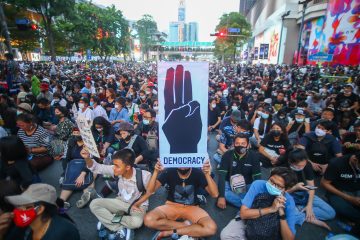
From periphery to core: COP27 and the era of loss and damage
“Already at 1.1-degrees of warming, we are living in an era of unmanageable loss and damage. We on the frontlines are paying the price for decades of wholly insufficient action by those most responsible for the dangerous state of our climate.” (AOSIS’ opening statement at COP27) At the outset of the 27th Conference of the Parties (COP) to the United Nations Framework Convention on Climate Change (UNFCCC), the Alliance of Small Island States (AOSIS) made clear what they wanted to get out of this gathering under the hot November sun of Sharm el-Sheikh. They would not leave Egypt without an acceptable agreement that would reflect their decades long struggle for financial support on loss and damage. And, against all odds, …

What is peripheral about Thai (democratic) politics?
The latest mass uprisings in Thailand have driven a wedge between people who remained complacent towards the status quo and people who sought to upend what they saw as conservative authoritarianism by resorting to rally politics. The latter wished to take matters into their own hands and steer the country in a more democratic direction as faith in mainstream political actors dwindled. Should marginalized civil-society actors not take drastic measures, future political trajectories will remain shrouded in conservative mist. A military coup in 2014 had enabled the conservative establishment to tighten its grip on the country’s politics. This is not a one-off incident but a recurring pattern in Thailand’s modern history. Via military coups, conservative forces have always found a …

“Laters, baby!”: How the British Prime Ministers’ discourse of delay turned Indyref2 into a peripheral issue
Scotland held a vote on independence on 18 September 2014, with 55 percent of the voters rejecting leaving the United Kingdom. Yet, the issue was thrust back into the spotlight in 2016, when the UK voted to withdraw from the EU, with repeated calls for a second Scottish plebiscite growing louder ever since. As in 2014, the generally accepted (albeit not universal) position has been that Westminster’s approval is needed to put a referendum on Scottish independence beyond legal doubt. The two British Prime Ministers (PMs) who held office during this time (2016–2021), Theresa May and Boris Johnson, consistently reiterated their opposition to another referendum and ruled out granting any such consent. In doing so, they employed various discourse strategies …

A Historical Perspective on the Political Limits of “My Body, My Choice”
In the context of the U.S. Supreme Court repeal of Roe v. Wade, the struggle for access to abortion and reproductive freedom continues. In Germany, abortion remains a criminal act only granted under specific conditions and requirements. Apart from ethical and legal requirements, abortions are hardly mentioned in most medical curricula. There is a shortage of medical practices that perform abortions, especially in rural areas and if there is no “medical or criminological indication”, the procedure is not covered by health insurance, costing between €300 to €600. §218 of the criminal code that criminalises and regulates abortion is a remnant from the imperial penal code of 1871 (only the GDR legalised abortion in 1972). Radical feminists in Germany were at …

Should Animals Have Political Rights?
The common view in both scholarship and practice is that politics is an exclusively human concern: a practice by humans for humans. Man, as Aristotle described him, is ‘zoon politikon’, a political animal. For Aristotle, governing and being governed is both the essence and purpose of human beings, and this quality not shared by any other creature that we know of. Crucially, this human-exclusive understanding of politics is still widely shared today. That is not to say, of course, that politics is completely unconcerned about animals. Policy-makers do sometimes turn their attention towards animals, and most states have instituted, for example, a set of animal welfare laws that prohibit practices which are deemed to be ‘cruel’ or to cause ‘unnecessary …









